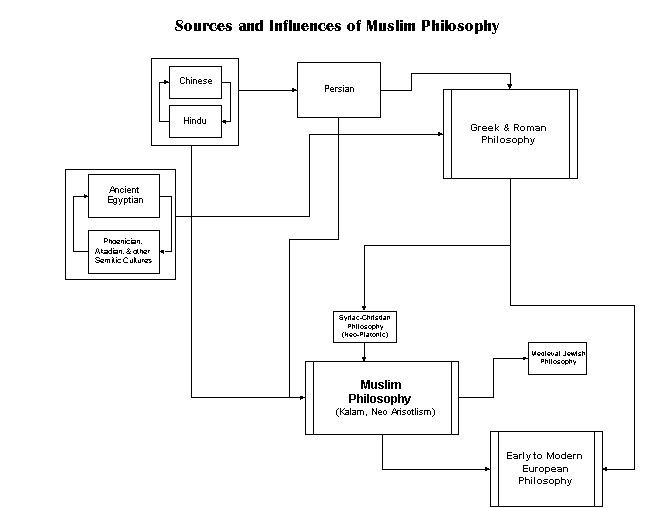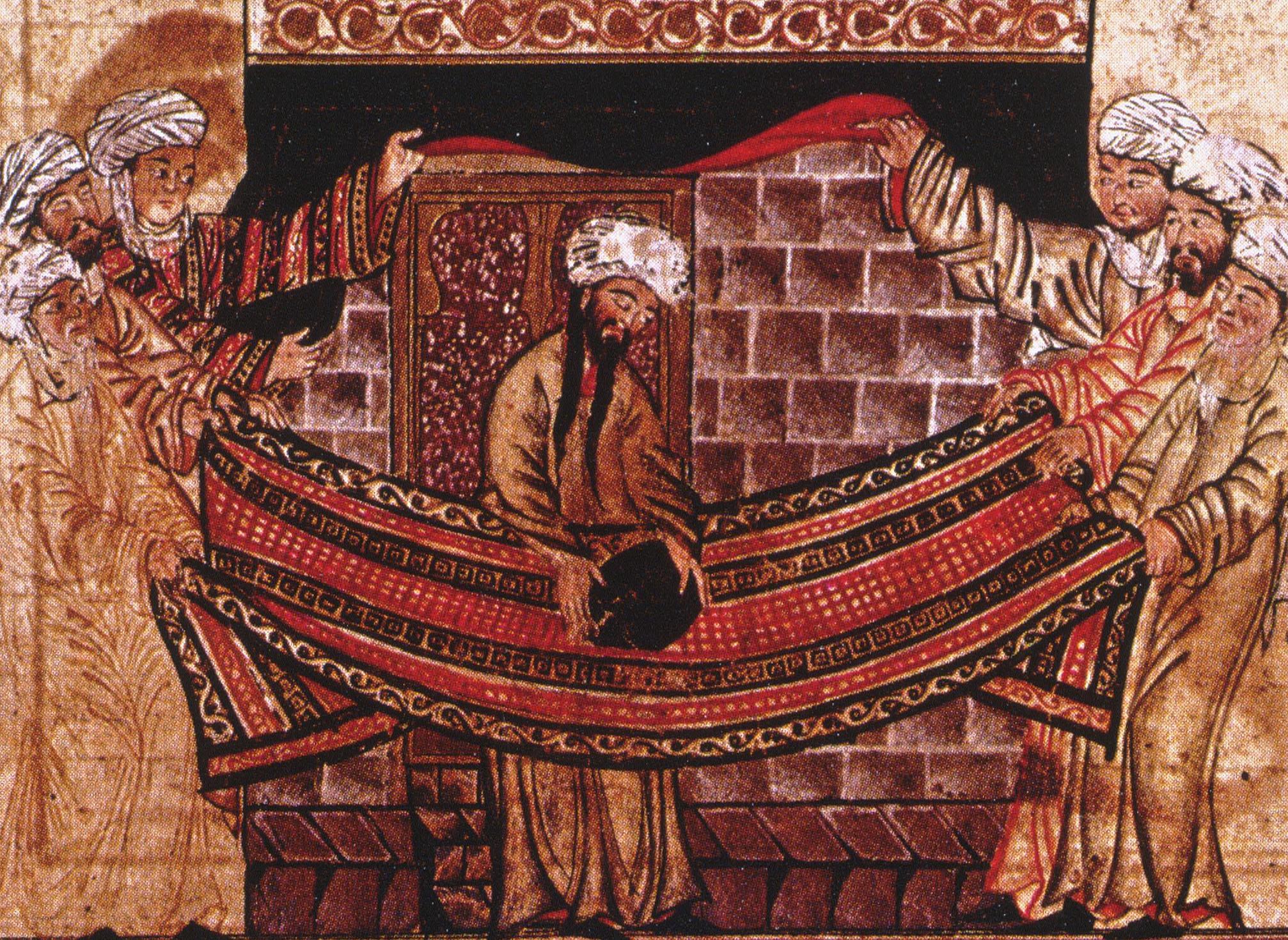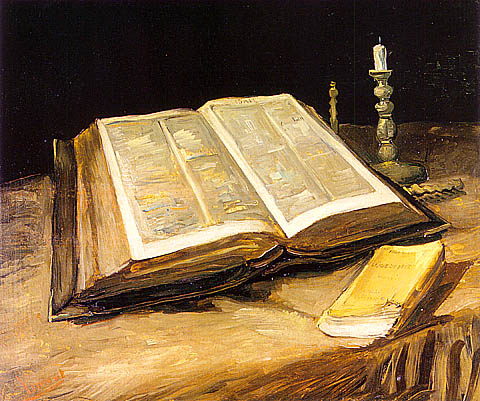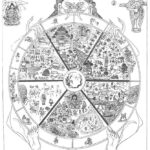The Origins and Philosophy of the Islamic Faith
Despite Charlie’s Jewish heritage, at least Jewish by blood, and his penchant for the less rigid and orthodox theological systems of the East, his knowledge of Islam began with a fundamental aversion for its fundamentalist interpretation which, along with its Jewish fundamentalist counterpart, appeared to be the source of so much conflict and political turmoil in the modern era, ironically enough in the very same region of the world where civilization first emerged some seven thousand years ago or so.
But he couldn’t properly explore the evolution of metaphysics and theology in Western civilization and its evolution into science proper, without exploring its development and evolution within the context of Islam which had had such a profound influence on the development of Western civilization after the so-called fall of the Roman Empire, through the Middle Ages and the Scientific Revolution and even into modern times where the influence of Islam remained so strong in the region which it emerged from – the Middle East, Northern Africa and within all the Islamic and Muslim communities of the world to which it had spread in the Information Age. It was clear that you couldn’t look at the theological development during this time period without looking not only through the lens of Christianity, but also through its derivative Islam, the latter of which was and continues to be a major religious and cultural force in the Western world starting with of course its introduction by Muhammad in the 7th century.
Interestingly enough, once Charlie started digging into this era of metaphysical and theological evolution from an Islamic perspective, he found that the early Muslim theologians and philosophers also leaned heavily on Hellenic (Greek) philosophy for their legitimacy and authority in much the same way that their Christian counterparts had done during its early development, even going so far as to refer to Aristotle as the “First Teacher” in some philosophical contexts, as it was to Aristotle’s teaching more so than any other that early Islamic philosophy turned to for its metaphysical and philosophical foundations.
Origins of Islam
As the stability of the Roman Empire broke down in the 5th century, marked most notably by the sacking of Rome by the Visigoths in 410, a new center of influence and power emerged in the Eastern part of the Roman Empire with its capital in Byzantium, later renamed Constantinople and today called Istanbul in the modern nation of Turkey. The Byzantine Empire, or Eastern Roman Empire, as it came to be known by more modern Roman and Western historians, was effectively an extension of the Roman Empire in the East after Rome collapses in the 4th century, although it reflected a much more Hellenic and Greek outlook than its Latin counterpart to the West. The state sponsored religion remained Christianity however, and this Empire persisted as a force in the Mediterranean and Near East for a thousand years or so until Constantinople fell to the invading Ottoman Turks in 1453.
As orthodox Christianity matured and spread alongside first the Roman and then Byzantine Empire, a counter religious force emerged in the Middle East that rejected some of the basic tenets of Christianity. In order to understand the socio-political forces which lay at the root of this emergence, it must be pointed out that Christianity was anything but inclusive and tolerant from a theological perspective.
Through the power and authority of the underlying political forces of first the Roman and then the Byzantine empires, along with the strong influence of the Church which was viewed as an extension of the teachings of Christ, alternative religious outlooks and theological schools were outlawed and actively persecuted starting in the 4th century or so – hence we have the notion of pagan religions which although was initially used to describe simply non-orthodox Christian religious schools and doctrines but then in modern times whose meaning has expanded to include all non-Abrahamic religious belief systems. This effectively left no room for any alternative theological or religious belief systems in territories controlled by these Christian based authorities. This included those who believed in Christ as a prophet but not necessarily as the one and only messiah as the orthodox Christian community held, but also even those who believed in the teachings of Christ but did not adhere to the orthodox theological position of the Trinity which had become synonymous with Christianity by the 5th and 6th centuries.
This was the socio-political backdrop and context within which Islam is born as a counter force to Christianity by Muhammad (c. 570 – 632 CE) in what is now modern day Saudi Arabia and Syria, lying just to the East of Constantinople which was the center of Christianity at the time. As Charlie had shown however, these religious movements had very strong political motivations as their basis and they grew and evolved alongside their respective political institutions. This was the case for not only Christianity, but also for Islam and even for Judaism whose social and political motivations sat at the heart of its scripture and historical traditions as reflected in the Old Testament and Torah.
It’s interesting to note that Eastern religious development shares similar evolutionary traits, as Buddhism effectively emerges as a reaction to the inclusive social structure that was part of the Vedic tradition which preceded it, speaking again to religion as an evolutionary aspect of mankind, evolving alongside socio-political institutions as a form of societal “natural selection” as religious forces bind together cultures and people more strongly, allowing for more vast and cohesive cultures and civilizations than would be possible without the sharing of a common faith or belief in a common prophet and/or religious tradition.
The origins of Islam and the Qur’an are an interesting topic in and of themselves however, and its study from an academic perspective is still in relatively immature stage at least in comparison to its sister religions Judaism and Christianity. For example, a very interesting philological analysis of the language in the Qur’an by Robert M. Kerr, a respected Semitic linguistic historian, provide some sound (philological) evidence that the language in the Qur’an reveals more of a Syrian rather than southern Saudi Arabian origin, which is inconsistent with the traditional, orthodox Islamic history. A Syrian origin of the text, the same region where Jesus lived and taught, could point to more of a Jewish based origin of the faith than is traditionally ascribed to it, or at the very least connects the dots with Judaic theological circles, circles which were marginalized and persecuted by the dominant Christian factions of the day, more directly than has been done before.
Islam, as a “religion of the book” and its consequent development of such a belief system of course presupposes the presence of a literate and literary culture. The present article [Aramaisms in the Qur’an and their Significance] sheds some light on the evolution of this culture over the course of Semitic and Semito-Hellenistic religious history, as well as the formation and development of monotheism. Since both the Qur’an and Islamic tradition view biblical historiography as history that actually occurred – an anachronism – they constitute a part of this continually evolving revelatory truth. Understood in this way, the religion that emerged from the Qur’an is one of many on a continuum that began in the Syro-Palestinian region: the local cults of the Bronze and Early Iron Ages gave rise to the religions of Judah, which later brought about manifestations of Jewish religion when the former came into contact with Hellenism. This later gave rise to Judaisms and Christianities, from which Islam would later arise. The latter as a religion which originated in the “full light of history” only makes sense in the context of Church History.[1]
In this context, leaving aside whether or not the Qur’an represents revelatory scripture of not, the socio-political forces at work which underpinned the early development of Islam can be seen as a pre-requisite for its survival. Again, we’re looking at theological development from a Darwinian evolutionary context here – in order for Islam to survive, it needed a socio-political structure to exist, the Qur’an providing the underlying social and theological cohesion that underpinned the Muslim Conquests which ran directly parallel to its spread throughout the Middle East.
Viewing religious development in general from an evolutionary and socio-political perspective (Judaism, to an even greater extent Islam, and even with Christianity although its political influence was more tangential than its sister religions) sheds significant light on present day conflicts within the Middle East as different factions of Islam fight amongst themselves for sovereignty and independence and the Jewish state of Israel continues to fight with the Palestinians in defense of its own survival. It also explains the emphasis on law and custom, again particularly within the Jewish community (Torah is typically translated as “law”) and then again even more strongly in the Islamic community where Islamic states and the prevalence of Sharia, or Islamic law, is a major point of contention, and arguably misunderstanding, between the Islamic states in the Middle East and the West.
Looking at religion as a human socio-political evolutionary force rather than as revealed, divinely ordained and fixed eternal set of laws and beliefs, forces one into a more flexible theological paradigm, where theology is viewed as a complementary socio-political development rather than as a scriptural interpretative exercise. This compartmentalization of theology was one of the byproducts of the Scientific Revolution in the West and one of the main reasons why nation states in the West, for the most part, are able to manage its societies with a relatively broad spectrum of religious freedom and have been able to retain (relative) stability for the past three hundred years. This doctrine of the separation of Church and State, again seen as an evolutionary socio-political construct, is one of the main factors why the Western nations have been able to prosper in the last few decades without conflict – at least without the type of conflict that is and has been raging in the Middle East for at least the past 100 years which has religious and racist divisions at its root.
This isn’t to say that Western democracy as a political structure is without problems, but this form of government – which again was a byproduct of the Scientific Revolution and Enlightenment Era in the West – does allow for religious freedom, freedom of expression and protest (to at least some degree) and a (arguably pseudo) democratic system of election of government officials which allows for the evolution of policies and laws that reflect present day challenges and problems.
A political system that is based upon doctrines, customs and beliefs that are 1000 years old – no matter how revealed and profound they may have been at the time of inception – is doomed to fail its people, doomed to not survive in fact. This is a law of socio-political evolution, which goes hand in hand with the theory of the theology as a human evolutionary construct, analogous to Darwin’s law of natural selection except on a more grand cultural and social scale.
Understanding Islamic Philosophy
But to understand Islamic philosophy, and in particular its fundamental belief in the immortality of the Soul and its relationship to the rational and intellectual faculty which it, consistent with the Christian and Judaic religious traditions which preceded it, represents the defining characteristic of mankind, one of course has to look at the scripture which defines the faith, the Qur’an, along with the philosophical interpretations of the text and faith of the most influential Islamic scholars and philosophers, all of whom for the most part have interpreted the scripture within the context of the Greek and Christian theo-philosophical traditions which form the basis of Christianity as well, albeit with a different emphasis and theological point of view.
Islam derives from the same Abrahamic historical and cultural heritage as does Judaism and Christianity, and yet at the same time it espouses the belief that although Jesus as well as Moses were in fact true prophets of God, or Allah, that their message had been altered and/or misinterpreted over time and that it was Islam, as revealed to Muhammad by Allah himself and as reflected in the words of the Qur’an, is the one and only unadulterated version of Truth and represents the final revelation of God in the modern era. In the words of Allah as transmitted to Muhammad in the Qur’an:
And We did certainly give Moses the Torah and followed up after him with messengers. And We gave Jesus, the son of Mary, clear proofs and supported him with the Pure Spirit. But is it [not] that every time a messenger came to you, [O Children of Israel], with what your souls did not desire, you were arrogant? And a party [of messengers] you denied and another party you killed.[2]
One of the proposed etymologies of the word “Islam” is considered to be the assimilation and integration of three Arabic letters and their associated meanings; “s-l-m” – the combination of which are taken together and denote “wholeness”, “safety” or “peace”. To this end, “Islam” is the infinitive of a verb which can be loosely translated into English as something along the lines of “the voluntary submission to God’s will” and the word Muslim, which is what followers of Islam are referred to as of course, is the active participle of the same verb.[3]
During the latter years of his life, Muhammad not only founded Islam and established the Muslim brotherhood, but he also became a renowned political leader and consolidated the various warring tribal forces of the Saudi Arabian peninsula, culminating toward the end of his life in the Constitution of Medina in 622 CE which established the first Islamic state in history. With this historical development not only was the religion of Islam was born, but the notion of the Islamic state was born right alongside it.
As the story goes it is said that the Qur’an was transcribed, written down, by Muhammad’s followers shortly after his death, and that the words themselves were revealed to Muhammad by the archangel Gabriel in a series of revelations starting from when he was around 40 years old up until the end of his life. Like most revealed scripture, it is believed that the chapters, verses, and overall compilation of the text of the Qur’an as we know it today were done by later editors and transcribers of Muhammad, not by Muhammad himself.
The Qur’an, written in poetic Arabic, is composed of verses, or ayat, that make up 114 chapters, or Suras, which are classified either as Meccan or Medinan depending upon the place and time of their claimed revelation. The Qur’an, along with the biographical and historical material associated with the life of Muhammad in what is referred to as Al-sira, or simply sira, along with the hadith – which are sayings and phrases attributed to Muhammad or his followers that have been handed down over the centuries in either oral or written form – in toto form the basis of the Islamic faith and religion as it is practiced today some 1500 years after its inception.[4]
And what cannot be denied of course, and the cause of much confusion and misinterpretation even in modern times, is the underlying different scriptural stances of the three different Abrahamic faiths that dominant the modern global religious landscape today – the Jews believing in the Books of Moses as their revealed scripture, the Christians believing in the (canonized) Bible which includes the Old Testament but looks to Jesus as their ultimate savior, and then the Muslims who believe in the revealed nature of the Qur’an as the harbinger of truth and law for our age.
Although Islam references and acknowledges the prophets of the Jews as documented in the Old Testament, and even acknowledges the Torah and Gospel as revealed scripture[5], it does not call out Jesus as the son of God and the one and only messiah as Christianity does, and in the Qur’an its message is quite clear that Christianity and Judaism, as it was practiced by the followers of the respective faiths as viewed through the eyes of Muhammad, had become watered down and diluted and no longer represented paths to righteousness or salvation. To the practicing Muslim, unless you were to take up the message of Islam as reflected in the Qur’an, then you would be subject to eternal damnation upon Last Judgment, just as the Christians believed was the fate of all those who did not take shelter in Jesus as their savior.
The Jews say “The Christians have nothing [true] to stand on,” and the Christians say, “The Jews have nothing to stand on,” although they [both] recite the Scripture. Thus the polytheists speak the same as their words. But Allah will judge between them on the Day of Resurrection concerning that over which they used to differ.[6]
Islam teaches that the Jewish and Christian religious traditions, similar to the view of the early Christian Church Fathers regarding pre-existing pagan and polytheistic faiths, had lost their way, and that despite their shared lineage and history with Islam, have had their faith tarnished and jaded over the centuries since the initial revealing of scripture had occurred with their respective prophets – Moses and Jesus respectively.
Muhammad’s message in the 6th and 7th centuries, which clearly resonated within a vast region of the Middle East and North Africa and still resonates across much of the same region today, was that the world was in need of a new, freshly revealed and newly interpreted faith which emphasized the oneness of God, Allah, and set forth new laws and customs which were necessary for to save mankind spiritually from the confines of the evil bondage of the material and sensual world, and socially from political peril and turmoil. Even more so Christianity perhaps, Islam looks to its scripture the Qur’an and the life of its prophet Muhammad as the one and only means to salvation, resting on the revealed nature of its scripture along with its breadth and scope of social and legal tenets as the basis for all spiritual life and ethical conduct and ultimately as the source of salvation.
From a more academic and historical perspective, the Qur’an is believed to have been transcribed a generation or two after Muhammad’s death by one or more of his followers in order to ensure a single source of scripture for the entire Muslim community and discourage fragmentation which had been an issue with early Christianity before the Biblical canon was initially established some four of five centuries after Jesus died. To this end, Islam over the centuries has remained largely unified in its basic theology and content of scripture, much more so than Christianity in fact with its different sects and different Biblical canon traditions. It is the adherence and belief of different sets and interpretations of what the Muslim community refers to as hadith, various oral and non-written teachings ascribed to Muhammad and his successors by different Muslim communities, rather than different interpretations of the Qur’an itself per se, that is the source of the different Islamic variants and sects that persist today; most notably the Sunni, Shi’a and Ibadi.
Consistent with all orthodox religious believers of scripture across all major faiths, but perhaps even more so in the Muslim community, fundamentalist and orthodox followers of Islam believe that the precise words and verses that exist in the Qur’an were not only revealed directly to Muhammad by Allah (thorough the archangel Gabriel) but also that this transcription of revelation was kept word for word, syllable for syllable, into the Arabic text of the Qur’an – hence the sometimes extreme literal interpretations of the contents and verses of the Qur’an by various orthodox members of the Islamic community as well as the importance of the recitation of certain passages daily. This tradition has antecedents in the Jewish tradition as well but not so much in Christianity, despite its divine view of the underlying meaning of its scripture.
Whether or not this transcription was in fact as accurate and unadulterated as Islamic historic tradition would have us believe, and of course whether or not one believes that the Qur’an represents a direct divine revelation at all, is like all religious doctrines a matter of faith. However, it is fairly safe to assume as most modern scholars do that the organization of the sayings of the Qur’an into verses and chapters (Suras) was a later invention of the author/editor of the Qur’an rather than a construct of Muhammad himself, speaking to the relevance and importance of written transcription upon the Islamic faith that is characteristic of all major religions no matter what their place in history is. We cannot ignore the role of the author and editor in the Islamic tradition just as in its Christian and Judaic predecessors. This is an important point, and it is lost on many of the so-called “believers” not only of Islam, but of Christian believers as well.
As Christianity incorporates the Jewish tradition into its heritage, establishing legitimacy and historical lineage, Islam also looks to the same historical and mythical narrative as encapsulated in the Old Testament to establish its own legitimacy and authority. What is worth pointing out here, and what is glossed over by most theologians and comparative religious historians, is the significance of this incorporation and what it says about the cultural and religious heritage of the founders of the religion, i.e. Muhammad. The question to ask is, if the Jewish tradition is effectively kept in tact, completely synthesized into the new faith into new, fresh, scripture, and the teachings of Jesus are not rejected but are also incorporated into the same prophetic lineage, is it not that big of a leap to conjecture that the origins of the Islamic faith had direct Jewish origins, i.e. Muhammad was either Jewish or extremely influenced by the Jewish faith and scripture, and that this community also believed in the teachings of Christ but did not espouse Christ as the one and only messiah – hence the introduction of a new faith which could encompass their beliefs, beliefs which had no place certainly within the orthodox Christian socio-political system of the time, and no place within the Jewish community either as they had rejected Jesus outright within the lineage of prophets (no doubt stemming from Jesus’s rejection of the rabbinic authorities which is so well documented in the New Testament).
So Islam, in juxtaposition with Judaism, accepts the message of Jesus as captured in the Gospels as revelatory as well, although it does not go so far as to accept him as the Son of God or of course as the only means of salvation as Christianity preaches. The Qur’an furthermore contains many references to the long line of Jewish prophets along with Jesus, and even goes so far as to directly reference Old Testament characters and stories such as Adam and Eve, Noah and the flood, etc., assuming in fact that the reader (or listener/student as the case may be) is already quite familiar with Jewish and Christian lore.
These stories are transcribed and relayed within its own unique and colloquial narrative and no doubt add a slightly different perspective on Old Testament and even Christian teachings, but nonetheless it consistently reinforces the notion that the message as it was revealed to the Old Testament prophets and to Jesus was true and legitimate, but that it had been so garbled by subsequent practitioners and followers that it was in need of a new and revised revelation, i.e. Islam.
Summary
Although the religious heritage and upbringing of Muhammad cannot be determined beyond a shadow of a doubt, the Qur’an itself reveals his theological stance, which again accepts the Jewish heritage and faith, accepts Jesus as a prophet within the same prophetic lineage and at the same time rejects the theological interpretation New Testament scripture by the orthodox Christian authorities. This places Muhammad squarely in the same group as the other competing early Christian sects which were branded pagan by the early Church and stamped out by the political forces that were under its sway, namely the Roman and then the Byzantine Empires.
What we see with Muhammad and his teachings then, is not only a religious movement which takes a hard line on theological monism, but also a social and political movement which establishes the boundaries and customs within which this new faith could be practiced – independent of the powerful Christian forces which held sway in that part of the world. The Muslim Conquests then, were a necessary condition to the spread of the faith. Without a state where the faith as accepted and could be practiced, there would have been no Islam faith at all.
This socio-political context within which Islam is created, sheds significant light on the idea of the Islamic state today, an extremely delicate and important aspect of political systems in the Middle East and one which the Western democratic (using a liberal definition) nations have an extremely difficult time understanding. But if Islam is understood within this context, the idea of the Muslim state and why it’s so important to many in the Muslim community can at least be understood. One may not agree with its tenets – the idea of Sharia law, the social and ethical customs that are embedded in the Qur’an itself (which is understandable given the age of the text and the advancements in technology, ethics, political philosophy, physics, etc. that have been made since the “scripture” was revealed) – but one can at least understand why it’s such an important aspect of the Islamic faith.
[1] Aramaisms in the Qur’an an their Significance by Robert M. Kerr, translated by Kira McLean. Published 2014, sourced from www.academia.edu at https://www.academia.edu/7684935/Aramaisms_in_the_Quran_and_Their_Significance.
[2] Qur’an Sura 2, Al-Baqara, verse 87. From http://quran.com/2.
[3] The Hebrew word Shalom and the Arabic word Salam, which both mean “peace” in their respective tongues, share a similar root to that of “Islam”. Note both Arabic and Hebrew are Central Semitic languages so share some of the same common word etymologies and meanings.
[4] The Qur’an, Sira and Hadith are roughly analogous to the concepts of the Tanakh, Torah, and Talmud in the Judaic tradition respectively which make up not only the revealed scripture of the Jews (the Torah), but also the rabbinical and oral teachings handed down over the ages after Moses via the Rabbinical tradition, i.e. the Tanakh and Talmud.
[5] “He has sent down upon you, [O Muhammad], the Book in truth, confirming what was before it. And He revealed the Torah and the Gospel”; Qur’an Sura 3, Al-Imran, verse 3.
[6] Qur’an Sura 2, Al-Baqara, verse 113. From http://quran.com/2.









Leave a Reply
Want to join the discussion?Feel free to contribute!